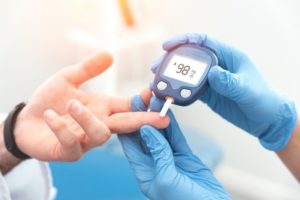
If you have type 2 diabetes, then you already know that you’re at a higher risk for many other medical conditions, such as cardiovascular disease and high blood pressure, especially if your blood sugar levels are not well-managed. However, another condition you might be at risk for is sleep apnea. According to recent research, having one of these conditions might worsen symptoms of the other. Continue reading to learn about the connection between type 2 diabetes and sleep apnea in Lutz, and what you can do to protect your health.
Sleep Apnea: More Than Just Snoring
Sleep apnea is a sleep disorder in which someone experiences pauses in breathing during the night. When you stop breathing, your brain enters panic mode and wakes you up gasping for air. If these episodes occur several times a night, it prevents you from achieving the deep sleep you need to feel refreshed in the morning.
The most common type of sleep apnea, obstructive sleep apnea, happens when the airway is blocked by tissues in the mouth or throat. In many cases, it causes loud snoring as air squeezes past the obstruction. Other common symptoms include morning headaches, waking up with a sore throat, and constant drowsiness despite getting plenty of sleep.
The Link Between Type 2 Diabetes and Sleep Apnea
Weight might be a factor in this connection. While not everyone with type 2 diabetes is obese, many people are. As a result, these people may have large deposits of fat around the neck, increasing the likelihood that tissues will collapse and block the airway at night.
In turn, sleep apnea can raise blood sugar levels. Frequently waking up during the night causes your body to release more stress hormones, which may cause stored glucose to be released into your liver. Over time, this could contribute to insulin resistance and ultimately type 2 diabetes.
How to Treat Sleep Apnea
If you’re a type 2 diabetic, or you experience daytime sleepiness or loud snoring, it couldn’t hurt to undergo a sleep study to test for sleep apnea. From there, treatment may be as simple as making a few lifestyle changes. For instance, losing weight can reduce pressure on your neck and keep your airway open. Avoiding alcohol and drugs before bed can also help by preventing the tongue from relaxing too much and falling back into the airway.
Additionally, you may want to talk to a sleep dentist. Some dentists have undergone advanced training in treating sleep apnea without the use of a loud, often uncomfortable CPAP machine. Instead, you might be able to wear an oral appliance to bed. This custom-fit device fits comfortably over your teeth and gently shifts your jaw to keep the airway open.
Preventing complications from type 2 diabetes and sleep apnea requires being proactive. Take charge of your health by talking to your doctor or dentist about how to minimize your risks from these conditions.
About the Author
Dr. Jay A. Nelson is a sleep dentist in Lutz, FL who is a Diplomate of the American Board of Dental Sleep Medicine, the American Sleep and Breathing Academy, and the American Board of Craniofacial Dental Sleep Medicine. He has helped countless patients attain the restful sleep they need and avoid complications from untreated sleep apnea. If you have any questions, Dr. Nelson can be reached through his website or by phone at (813) 949-0424.
